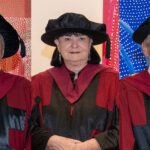The “Rosa Parks” of Western Australia’s Indigenous rights movement and a surgeon with an inspiring commitment to international aid were today announced as the 2013 John Curtin Medallists at a special ceremony held at Curtin University.
Helena Murphy (nee Clarke), 91, worked tirelessly and courageously for Indigenous rights in WA in the 1940s and 1950s and her efforts were a major contribution toward the granting of equality in education, citizenship and voting.
Dr Graham Forward organised emergency aid in Somalia after the 2004 tsunami disaster and has since established Australian Doctors for Africa (ADFA) to provide much-needed medical services to Ethiopia, Madagascar and Somalia.
Both were today presented with a John Curtin Medal, which is awarded by the University to recognise individuals or organisations displaying the attributes associated with Australia’s World War II Prime Minister – vision, leadership and community service.
Curtin Acting Vice-Chancellor Professor Colin Stirling said Mrs Murphy and Dr Forward were very worthy recipients of the award and acknowledged their outstanding vision and personal contribution.
“Helena’s story is an absolutely compelling one. As a young woman she campaigned bravely and outspokenly for equality, at a time when Indigenous people were subject to extreme racism, including the removal of children, police surveillance and not having the freedom to choose where they worked or travelled,” Professor Stirling said.
“Helena is most noted for her part in founding the Coolbaroo League in 1947, a political movement and Indigenous social club that aimed to gain equal rights in post-war Western Australia.
“It’s thanks to her efforts, along with fellow Indigenous rights campaigners, that Aboriginal people were given the right to vote and received wage equality and inclusion in the census as Australians.
“When newspapers published derogatory reports about Indigenous people, Helena responded with letters to the editor. Her fighting spirit was further shown when she applied to join the airforce and army despite the fact rules prevented Indigenous women from doing so.
“Helena Murphy is described by many people as a national treasure and it was wonderful to see her inspirational work recognised with the presentation of the John Curtin Medal.”
Professor Stirling said Dr Forward’s story was equally inspiring.
“Graham Forward is a full-time orthopaedic surgeon, devoted husband, father of eight children – three adopted from Ethiopia – and has still found the time to establish and build one of Australia’s most respected humanitarian organisations,” Professor Stirling said.
“Graham has shown tenacity and skill in establishing and building ADFA, which has been driven by a deep concern for the welfare of those less fortunate.
“His vision has been to provide long-term medical assistance to communities in Africa that are afflicted by severe health issues and he and his team have overcome extreme political and logistical challenges to make this a reality.
“As part of the work of ADFA, thousands of surgical procedures, consultations and ward rounds have been conducted and more than $10 million of medical supplies and equipment have been sent to areas of real need.”
The John Curtin Medals are presented each year on, or close to, October 7, the anniversary of John Curtin’s accession to the office of Prime Minister in 1941.
For more information about the John Curtin Medals and past winners, visit http://johncurtin.curtin.edu.au/medal/
Notes to editor
Interviews with the medallists and images from the John Curtin Medal ceremony are available on request.
Helena Murphy (nee Clarke) was born in 1922 and is most noted for her part in founding the Coolbaroo League in 1947, a political movement and Indigenous social club that aimed to gain equal rights in post-war Western Australia at a time of extreme racism, before Aboriginal people had gained the right to vote. Mrs Murphy lobbied the government on many Indigenous issues – including removal of children, citizenship, voting rights, deaths in custody and education – and attempted to join the air force and army, despite laws that prevented Aboriginal women from doing so.
Graham Forward completed his medical training in Perth and went on to do an MBA at the University of Bath. He later returned to WA and undertook postgraduate training in orthopaedics. He established Australian Doctors for Africa (ADFA) in 2005, after organising a medical team to travel to Somalia following the devastation caused by the 2004 Boxing Day tsunami. ADFA’s achievement include the introduction of new surgical procedures, completion of six major building projects and guiding local surgeons in the treatment of orthopaedic injuries.
Media Contact:
Simon White, Media Consultant, Curtin University
Tel: 08 9266 1931; Mobile: 0401 103 683; Email: simon.white@curtin.edu.au
Web: http://curtin.edu.au; Twitter: @CurtinPR
Hailey Ross, Public Relations, Curtin University
Tel: 08 9266 3357; Mobile: 0478 310 708; Email: hailey.ross@curtin.edu.au



